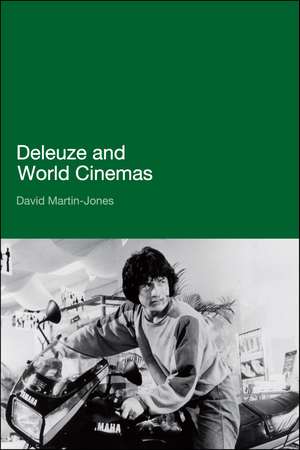Deleuze and World Cinemas
Autor Dr David Martin-Jonesen Limba Engleză Paperback – 16 feb 2011
| Toate formatele și edițiile | Preț | Express |
|---|---|---|
| Paperback (1) | 260.73 lei 6-8 săpt. | |
| Bloomsbury Publishing – 16 feb 2011 | 260.73 lei 6-8 săpt. | |
| Hardback (1) | 892.73 lei 6-8 săpt. | |
| Bloomsbury Publishing – 16 feb 2011 | 892.73 lei 6-8 săpt. |
Preț: 260.73 lei
Preț vechi: 297.09 lei
-12% Nou
Puncte Express: 391
Preț estimativ în valută:
49.90€ • 54.18$ • 41.91£
49.90€ • 54.18$ • 41.91£
Carte tipărită la comandă
Livrare economică 22 aprilie-06 mai
Preluare comenzi: 021 569.72.76
Specificații
ISBN-13: 9780826436429
ISBN-10: 0826436420
Pagini: 288
Dimensiuni: 156 x 234 x 20 mm
Greutate: 0.52 kg
Editura: Bloomsbury Publishing
Colecția Continuum
Locul publicării:London, United Kingdom
ISBN-10: 0826436420
Pagini: 288
Dimensiuni: 156 x 234 x 20 mm
Greutate: 0.52 kg
Editura: Bloomsbury Publishing
Colecția Continuum
Locul publicării:London, United Kingdom
Caracteristici
Deleuze's Cinema books are widely studied at advanced undergraduate and postgraduate level on courses in Continental Philosophy, Film Studies, French Studies and Cultural Studies.
Notă biografică
David Martin-Jones is Senior Lecturer in Film Studies at the University of St Andrews, Scotland. He is the author of Deleuze, Cinema and National Identity (2006), Deleuze Reframed (2008) and Scotland: Global Cinema (2009), and co-editor of Cinema at the Periphery (2010) and Deleuze and Film (forthcoming). He is on the editorial boards of Film-Philosophy and A/V: The Journal of Deleuzian Studies.
Cuprins
Introduction: Deterritorializing Deleuze \ Spectacle I: Attraction-Image \ 1. The Attraction-Image: From Georges Méliès to the Spaghetti Western \ Impossible Voyage (1904) \ Django (1966) \ Keoma (1976) \ History: Deleuze After Dictatorship \ 2. The Child-seer in and as History: Argentine Melodrama \ Kamchatka (2002) \ 3. Folding and Unfolding History: South Korean Time Travel Movies \ Calla (1999) \ Ditto (2000) \ 2009: Lost Memories (2002) \ Space: Geopolitics and the Action-Image \ 4. Not just any-space-whatever: Hong Kong and the global/local action-image \ Police Story (1985) \ 5. Globalization 's Action Crystals: Los Angeles in Michael Mann Blockbusters \ Heat (1995) \ Collateral (2004) \ Spectacle II: Masala-Image \ 6. The Masala-Image: Popular Indian (Bollywood) Cinema \ Toofani Tarzan (1936) \ Awaara (1951) \ Dilwale Dulhania La Jayenge (1995) \ Conclusion: The Continuing Adventures of Deleuze and World Cinemas \ Bibliography \ Index.
Recenzii
This monograph is an ambitious, yet well executed project... Martin-Jones makes an important and precise contribution to Deleuzian scholarship, despite the broad and expansive nature of the topic at hand. As the global film industry has evolved and become more interconnected since the 1980s, we must refresh our ideas about the de/ reterritorialised flows of this global rhizome... Rather than letting Deleuzian scholarship remain confined in Eurocentric boundaries, Martin-Jones is allowing a morphogenetic response from the Cinema books criticism to a wider, global range of films... My final thought on this book is that it is lucid, well structured, simple and effective... Martin-Jones has written a thought-provoking and provocative monograph.
Martin-Jones sees film as a transnational rhizome that continually deterritorializes and reterritorializes the histories, cultures and aesthetic traditions with which it engages in a limitless stream of endlessly morphing varieties. His critique of Deleuzian film theory is meant to deterritorialize the Cinema books and thereby enable their repetition in difference when they come into contact with the cinema otherwise "Othered" from their pages (235). He does this with considerable success, and his prose is usually less mannered than the sample I just quoted. ... True to its title, Deleuze and World Cinemas blends a thorough grasp of Deleuzian theory with a wide-ranging view of film history, production protocols, and popular reception in countries and cultures around the globe. I trust that other film philosophers will take up its constructive critique of Deleuze's contributions, analysing and rectifying the gaps resulting from his Eurocentric bias.
David Martin-Jones' monograph Deleuze and World Cinemas ... reads Deleuze's Cinéma against the grain with a level of acuity rare among the myriad similar projects to have surfaced lately.
'David Martin-Jones' admirable new book achieves something rare in the proliferating field of Deleuzian philosophy of film: an original study that is both critical and creative, an intervention in the "film as philosophy" debate that is at once theoretical and historical. ... Martin-Jones' contextualist critique of Deleuzian film philosophy, which at once challenges and extends its limits, marks an important advance in contemporary film philosophy. Deleuze and World Cinemas shows remarkably well, moreover, what a genuinely pluralist Deleuzian film philosophy might look like.'
Nos encontramos, pues, con uno de los mejores conocedores de la obra de Deleuze, ante una obra que destaca por la brillantez de sus análisis fílmicos y por su loable esfuerzo por renovar y enriquecer la tipología de imágenes que proponen Cinéma 1 y Cinéma 2 a partir de una confrontación con cines del mundo [...]
This challenging and exhilarating rereading of Deleuze is typical of Martin-Jones's methodology of close engagement with film form, of his work with other scholars, and his willingness to debate Deleuze's conclusions, all of which are to the book's credit.
The continued relevance of Deleuze to film theory now rests in the ability of scholars to convincingly demonstrate the applicability of his methodology beyond the temporal and geographical confines set by his original works. Martin-Jones does precisely this, persuasively refining and expanding Deleuze's taxonomy of cinematic images in relation to a global 'outside'. Emphasising the need to take into account the geopolitical context in which films circulate as well the socio-historical milieu in which they are produced and distributed, the text exemplifies a recent methodological shift in screen-studies, 'which acknowledges precisely the aesthetic and cultural differences apparent in films from around the world' (p. 11). The result is an original and wide-ranging reconsideration of Deleuzian ciné-philosophy in relation to an altered and continually altering global context. . There can . be no doubt as to the importance of Martin-Jones' project, the brilliance of his deeply contextual filmic analysis, or the originality and depth apparent in each chapter of the text.
This is a lucid, compelling and bold assessment of the Cinema books.
"Through close readings of films from a wide range of periods, genres, regions and styles, Martin-Jones provides convincing arguments for the relevance of Deleuze's film theory and for the necessity of recasting, revising and extending many of Deleuze's key concepts to deal with the diverse cinemas of the world. Martin-Jones writes with clarity and verve, bringing lucidity to Deleuze's difficult texts and offering provocative insights into a variety of cinematic traditions and practices. A superb contribution to Deleuze studies and essential reading for anyone interested in world cinemas" - Ronald Bogue, University of Georgia, USA
Deleuze and World Cinemas is distinctive in the critical literature on cinema: it offers a reading of Deleuze that is neither for nor against the philosopher. It is respectful of Deleuze's writings on cinema, but the book is steadfast in its tracing of the various ways in which Deleuze's formulations of the time-and movement-images, their Eurocentrism, necessitate their reconsideration in the context of World cinemas. Jones argues convincingly and in a lucid and engaging style for an "a-Deleuzian" position based on a careful examination of the Deleuze texts themselves, on major studies of Deleuze's cinematic philosophy, and on seminal writings in cinema theory and practices. Most striking is Martin-Jones's selection of films that, instead of rehearsing usual canonical suspects, opts for an analysis of popular films from Argentina, South Korea, Hong Kong, Hollywood, and India to refine on, expand, and resituate Deleuze's thoughts on cinema in the context of globality." - Marcia Landy, University of Pittsburg, USA
"Martin-Jones's application of Deleuze on cinema to a global context goes well beyond mere idolatry. He offers at once, a critical reading of Deleuze's ideas, a comprehensive account of the development of contemporary global cinema, and a wealth of critical film readings. The book is a must for those interested in Deleuze on the way cinema thinks as well as those interested in the way global culture is articulated in a wide variety of contemporary films" - Michael J. Shapiro, University of Hawai'i, USA, Author of Cinematic Geopolitics
Martin-Jones sees film as a transnational rhizome that continually deterritorializes and reterritorializes the histories, cultures and aesthetic traditions with which it engages in a limitless stream of endlessly morphing varieties. His critique of Deleuzian film theory is meant to deterritorialize the Cinema books and thereby enable their repetition in difference when they come into contact with the cinema otherwise "Othered" from their pages (235). He does this with considerable success, and his prose is usually less mannered than the sample I just quoted. ... True to its title, Deleuze and World Cinemas blends a thorough grasp of Deleuzian theory with a wide-ranging view of film history, production protocols, and popular reception in countries and cultures around the globe. I trust that other film philosophers will take up its constructive critique of Deleuze's contributions, analysing and rectifying the gaps resulting from his Eurocentric bias.
David Martin-Jones' monograph Deleuze and World Cinemas ... reads Deleuze's Cinéma against the grain with a level of acuity rare among the myriad similar projects to have surfaced lately.
'David Martin-Jones' admirable new book achieves something rare in the proliferating field of Deleuzian philosophy of film: an original study that is both critical and creative, an intervention in the "film as philosophy" debate that is at once theoretical and historical. ... Martin-Jones' contextualist critique of Deleuzian film philosophy, which at once challenges and extends its limits, marks an important advance in contemporary film philosophy. Deleuze and World Cinemas shows remarkably well, moreover, what a genuinely pluralist Deleuzian film philosophy might look like.'
Nos encontramos, pues, con uno de los mejores conocedores de la obra de Deleuze, ante una obra que destaca por la brillantez de sus análisis fílmicos y por su loable esfuerzo por renovar y enriquecer la tipología de imágenes que proponen Cinéma 1 y Cinéma 2 a partir de una confrontación con cines del mundo [...]
This challenging and exhilarating rereading of Deleuze is typical of Martin-Jones's methodology of close engagement with film form, of his work with other scholars, and his willingness to debate Deleuze's conclusions, all of which are to the book's credit.
The continued relevance of Deleuze to film theory now rests in the ability of scholars to convincingly demonstrate the applicability of his methodology beyond the temporal and geographical confines set by his original works. Martin-Jones does precisely this, persuasively refining and expanding Deleuze's taxonomy of cinematic images in relation to a global 'outside'. Emphasising the need to take into account the geopolitical context in which films circulate as well the socio-historical milieu in which they are produced and distributed, the text exemplifies a recent methodological shift in screen-studies, 'which acknowledges precisely the aesthetic and cultural differences apparent in films from around the world' (p. 11). The result is an original and wide-ranging reconsideration of Deleuzian ciné-philosophy in relation to an altered and continually altering global context. . There can . be no doubt as to the importance of Martin-Jones' project, the brilliance of his deeply contextual filmic analysis, or the originality and depth apparent in each chapter of the text.
This is a lucid, compelling and bold assessment of the Cinema books.
"Through close readings of films from a wide range of periods, genres, regions and styles, Martin-Jones provides convincing arguments for the relevance of Deleuze's film theory and for the necessity of recasting, revising and extending many of Deleuze's key concepts to deal with the diverse cinemas of the world. Martin-Jones writes with clarity and verve, bringing lucidity to Deleuze's difficult texts and offering provocative insights into a variety of cinematic traditions and practices. A superb contribution to Deleuze studies and essential reading for anyone interested in world cinemas" - Ronald Bogue, University of Georgia, USA
Deleuze and World Cinemas is distinctive in the critical literature on cinema: it offers a reading of Deleuze that is neither for nor against the philosopher. It is respectful of Deleuze's writings on cinema, but the book is steadfast in its tracing of the various ways in which Deleuze's formulations of the time-and movement-images, their Eurocentrism, necessitate their reconsideration in the context of World cinemas. Jones argues convincingly and in a lucid and engaging style for an "a-Deleuzian" position based on a careful examination of the Deleuze texts themselves, on major studies of Deleuze's cinematic philosophy, and on seminal writings in cinema theory and practices. Most striking is Martin-Jones's selection of films that, instead of rehearsing usual canonical suspects, opts for an analysis of popular films from Argentina, South Korea, Hong Kong, Hollywood, and India to refine on, expand, and resituate Deleuze's thoughts on cinema in the context of globality." - Marcia Landy, University of Pittsburg, USA
"Martin-Jones's application of Deleuze on cinema to a global context goes well beyond mere idolatry. He offers at once, a critical reading of Deleuze's ideas, a comprehensive account of the development of contemporary global cinema, and a wealth of critical film readings. The book is a must for those interested in Deleuze on the way cinema thinks as well as those interested in the way global culture is articulated in a wide variety of contemporary films" - Michael J. Shapiro, University of Hawai'i, USA, Author of Cinematic Geopolitics













